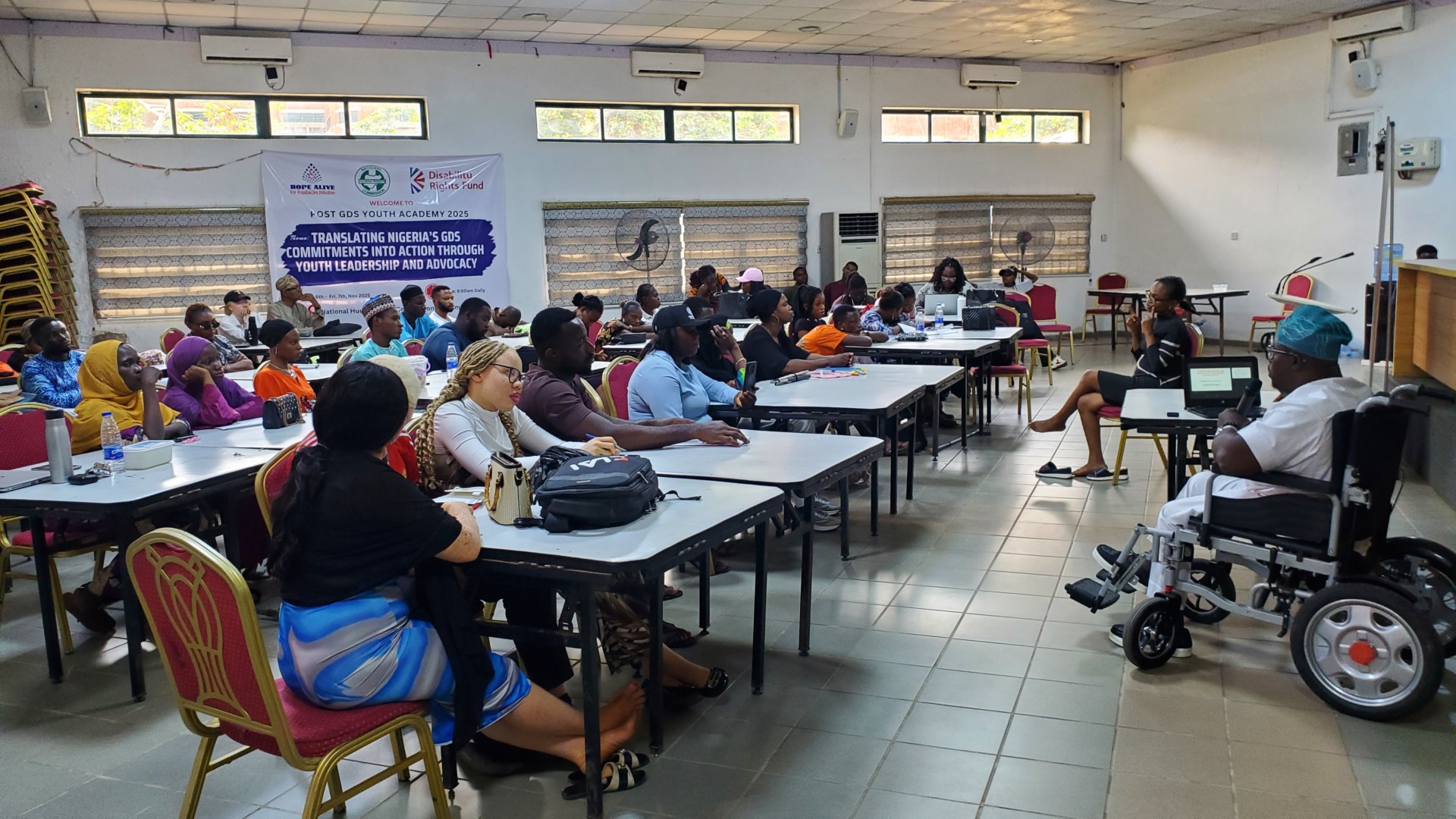Post-GDS Youth Academy 2025: How HAPI Is Empowering Young Disability Advocates in Nigeria

Empowering Young Advocates: Inside the Post-GDS Youth Academy 2025
Hope Alive for Possibilities Initiative (HAPI), supported by the Disability Rights Fund (DRF), hosted the Post-Global Disability Summit (GDS) Youth Academy 2025 in Abuja. Over two days, young persons with disabilities from different parts of Nigeria gathered to build their understanding of disability rights, strengthen their digital advocacy skills, and take ownership of monitoring Nigeria’s commitments from the Global Disability Summit.
The Academy was designed to help youth advocates move from awareness to action. It offered practical tools, collaborative learning, and hands-on sessions that equipped participants with the confidence and knowledge to engage government agencies, influence policies, and amplify disability inclusion at all levels.
Understanding Nigeria’s Commitments at the Global Disability Summit
Participants started by reviewing the commitments Nigeria made at the 2025 Global Disability Summit in Germany. These commitments span key areas, including inclusive education, digital accessibility, inclusive healthcare, humanitarian response, climate resilience, and legal capacity.
The Academy highlighted important national targets, including:
-
- Returning 70 per cent of out-of-school children to school by 2028.
- Achieving 80 per cent inclusion of persons with disabilities in the national health insurance scheme by mid-2026.
- Strengthening inclusive humanitarian systems before 2028.
- Improving digital accessibility across government platforms.
By breaking down the commitments into clear indicators and timelines, participants were able to understand not only what the government promised, but also how to track progress and ensure accountability.

Building Youth Capacity Through Storytelling and Digital Advocacy
One of the most energising parts of the Academy was the practical training on storytelling and digital advocacy. Facilitator Chris Agbo showed participants how personal stories can influence public opinion, shape policies, and humanise the disability experience. He introduced tools like Canva, Adobe Express, and InShot, making content creation more accessible to participants.
The session emphasised the importance of authenticity, clarity, and consistency. Participants learned how to create short videos, captions, flyers, and social media posts that communicate compelling messages while remaining accessible through alt text, subtitles, and clear language.
The Academy also encouraged participants to use identified hashtags such as HAPIGDS, Hapinigeria, and InclusiveHapi to strengthen visibility and build a unified advocacy community online.
Changing Narratives Through Ethical and Empowering Storytelling
Another powerful conversation emerged around how disability stories are told in Nigeria. Facilitator Pelemo Nyajo led discussions on ethical storytelling and the importance of shifting away from charity-based narratives to those grounded in dignity, rights, and lived experiences.
Participants reflected on how stories can either reinforce stereotypes or break them. They committed to producing content that respects persons with disabilities and highlights their strengths, challenges, and contributions to society.

Strengthening Networks and Strategic Partnerships
The Academy also focused on strengthening participants’ understanding of networking and stakeholder engagement. Facilitator Florence Marcus guided participants through practical stakeholder mapping, helping them identify high-influence partners such as government agencies, media houses, and organizations of persons with disabilities.
Participants learned how to build professional relationships, follow up on commitments, and nurture partnerships through trust, communication, and shared goals. These skills are essential for sustaining advocacy efforts and driving effective policy change.
Deepening Legal Awareness for Effective Advocacy
A core part of building a strong disability movement is understanding the legal frameworks that protect rights. Participants were introduced to the Nigerian Disability Act and committed to reading and discussing it beyond the Academy.
Understanding the Act will enable youth advocates to demand compliance, engage relevant authorities, and support persons with disabilities who face discrimination or exclusion.

Key Outcomes from the Post-GDS Youth Academy
-
- The two-day Academy recorded several important achievements. Participants gained:
- A deeper understanding of Nigeria’s GDS commitments.
- Stronger storytelling and digital advocacy skills.
- Improved knowledge of the Nigerian Disability Act.
- Practical monitoring frameworks for tracking government actions.
- A growing network of youth advocates committed to collaboration.
- Renewed confidence and motivation to champion disability inclusion in their communities.
The Academy successfully positioned youth with disabilities as key actors in Nigeria’s disability movement. Their commitment to long-term advocacy and monitoring reflects a growing shift toward youth-led accountability in the sector.
Looking Ahead: Sustaining the Momentum
HAPI remains committed to supporting these young advocates through continued mentorship, coordination, and collaborative monitoring of Nigeria’s GDS commitments. The organisation will also keep working with the Disability Rights Fund to support ongoing advocacy, storytelling campaigns, and grassroots engagement.
The Post-GDS Youth Academy has set a strong foundation for a more coordinated, informed, and confident youth movement for disability rights in Nigeria. Through consistent digital campaigns, ethical storytelling, and strategic partnerships, participants are now better equipped to drive inclusion and ensure that persons with disabilities are not left behind in national development.

Add Comment